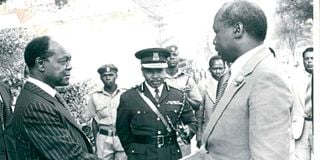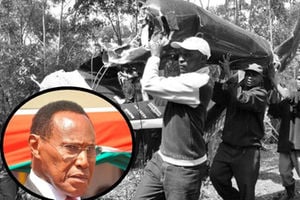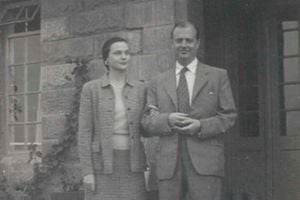
In this undated photo, Attorney-General Charles Njonjo (left) welcomes President Daniel arap Moi (right) to the Kenyatta Conference Centre. Looking on is Commissioner of Police Ben Gethi (centre).
Among the first high-ranking public officers to get to know about the attempted coup in the early morning of August 1, 1982 was then police commissioner Ben Gethi.
According to senior counsel Paul Muite, Mr Gethi — an officer who had received training in Israel, UK and the USA — knew well that more than 90 percent of coups happened on weekends, the reason why he was always working on Saturdays and Sundays and probably rested on Mondays or Tuesdays.
So when disgruntled soldiers from the Kenya Air Force attempted to overthrow President Daniel Moi’s government on the fateful day, Mr Gethi rushed to his home in Village market and immediately phoned Moi.
The line to Moi’s Kabarak home, according to Mr Muite, had been disconnected. Mr Gethi tried the police line but no one was picking as President Moi was asleep in his bedroom as the special line rang in the living room.
Mr Gethi then decided to call Attorney-General Charles Njonjo to inform him about the happenings. This was a mistake that he would live to regret.
The coup was later crushed when loyal forces from the Kenya Army, the GSU and regular police joined forces to quell the rebel soldiers.
A week later, among the people who issued various statements was police commissioner Gethi as peace was being restored, earning praise from Moi. In one of the statements, Mr Gethi warned Kenyans against hiding KAF rebels.
But when calm was finally restored, Mr Gethi was among the casualties of the attempted coup. He was shown the door on a Saturday morning on grounds of ‘public interest’.
In a statement, President Moi said: “I have decided that in the public interest, you will be relieved of your duties as a commissioner of police. Another officer has been appointed as the new commissioner of the Kenya police to replace you. These changes will be effective immediately.”
Mr Gethi was immediately replaced by 49-year-old Bernard Kiarie Njiinu, who was the deputy commissioner of police in charge of operations.

Bernard Kiarie Njiinu.
Detainee

Former police commissioner Ben Gethi.
Before he was retired, Mr Gethi received a call directing him to head to State House. He hurriedly told his driver to take the passenger’s seat and he drove himself to the house on the hill.
Upon reaching the gate, Mr Muite said he found armed men who directed him to leave his vehicle and get into an awaiting car. The armed policemen then drove him back to his house and ordered him to hand over any government store in his possession. He complied and was later driven to Naivasha prison where he was held in solitary confinement for six months, Mr Muite said.
Mr Gethi was credited for making the paramilitary GSU into an elite squad when he was the commandant, where he served from 1967.
Another senior official who suffered the humiliation is the Kenya Air Force commander Peter Kariuki who was stripped off his rank, honours and decoration. And despite being cleared by the court, Mr Kariuki is yet to get back his benefits, honours and decorations, as directed by the High Court.

Former Kenya Air Force commander Peter Kariuki.
Mr Muite said the refusal by the successive governments to honor the court orders is unacceptable. The veteran lawyer said it is unacceptable because the government led by the President swore to protect the Constitution and obey the rule of law.
Mr Kariuki denied claims that he failed to suppress the mutiny stating that upon learning of the alleged plan, he passed the information two weeks before, to General Jackson Mulinge, then Chief of General Staff, on July 14, 1982.
General Mulinge then decided that the information be passed on to the Military Intelligence as well as the Special Branch for full investigations under his own co-ordination. He considered the General to be a very crucial witness to his defence.
At the time of the mutiny, Mr Kariuki was at his farm in Timau, a few Kilometers from Nanyuki. But as soon as the mutiny by soldiers had been quelled, he was arrested and confined for some time at Kamiti Maximum Security Prison.
He was later transferred to Naivasha maximum security prison and held in solitary confinement for 147 days.
His attempts to summon General Mulinge to the court martial were rejected, a move the Court of Appeal said compromised his right to fair trial.
Court records showed that the judge advocate interjected 59 times when the nine prosecution witnesses testified, and 176 times during the evidence of Mr Kariuki’s six witnesses.
The court noted that for the greater part of the proceedings, the judge advocate literally took over from the prosecuting counsel, subjecting witnesses to near hostile cross examination.
“We have found that the violations of the appellant’s constitutional rights went far beyond his right to liberty and fundamentally implicated his right to a fair trial,” the Court of Appeal said.







